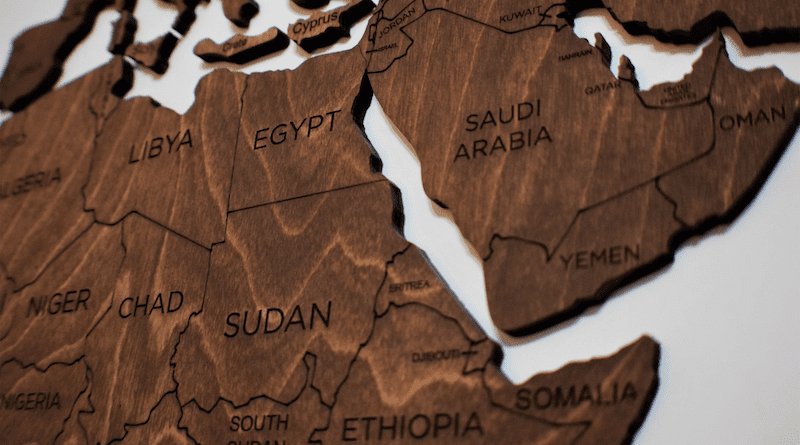The Horn Of Africa States: The Continuing Challenges – OpEd
It is a distinct region facing Arabia across the Red Sea, the Gulf of Aden on the north, the vast Indian Ocean on the east, and Sudan and Egypt on the northeast. It is a horn-shaped region, hence the name, and the most eastern part of Africa. The region has historically been important for always as the cradle of humankind with Lucy, the Miracle of some 3.2 million years ago as evidence.
The region enjoys a geostrategic significance as it has been one of the conduits of global trade from ancient times to the present, as a transmitter of goods, knowledge, and belief systems to and from Asia, Europe, and Africa. In the past, the region was strong enough to dominate not only the seas of the region but even further in parts of Arabia and India. However lately, the region has weakened through its own idiosyncrasies and interventions from more powerful nations from far and near, including West Asian countries such as the UAE, and Saudi Arabia, and major powers like China, the USA, and Europe.
The region is currently busy on itself with most countries of the region struggling for survival. They are troubled mainly by internal rifts and clan competitions for power, indirectly instigated and managed by foreign actors. Obviously, the ruling parties appear to have no respite to plan or even manage the day-to-day governance requirements. It is where the need for the region to work together to manage common issues becomes ever more important. These may include:
- Managing regional dynamics and interconnectivity such as Working together in sustainable developmental projects such as ports, airports, rail, and road connections.
- Working together in finding solutions at the regional level to prevent and manage conflicts within the region and within countries.
- Engage the youth of the region through developmental projects that keep them away from conflicts, violence, and/or migration.
One of the main challenges of the region includes the desire of Ethiopia to have access to a sea. This has been expressed blatantly to his parliament by Prime Minister Abiy Ahmed recently, which has stirred the region quite vehemently. Historical fallacies that Ethiopia had access to a sea in the past should not be used to justify this desire to have a free hand in others’ lands and coasts. There was no Ethiopia before 1932. There was Abyssinia and before that, there was Aksum and then there was Eritrea which was forcefully enjoined to Ethiopia but fought back to recover its own territory.
It is not that Ethiopia does not have access to the sea for it does. It already uses the port of Djibouti, and the relationship works well, and it can have access to other ports such as those of Somalia and/or Eritrea if negotiated well through bilateral deals or through a regional platform. It does not, however, own its own piece of the longest coast in Africa. It is one of those historical legacies that cannot be changed. The lowlands of the region do not have high or temperate mountains and they do not have high waterfalls to enable them to generate hydropower, completely under their control but they do not envy Ethiopia and so Ethiopia should not envy the lowlands of the region for their fortune to have this long coast of some 4,700 km.
However, the region as a block can work together in a platform where they are economically integrated, enjoy a common approach to the region’s problems be it internal or external, and have a common foreign policy when dealing with non-regional parties. That is how the peoples of the region can be made closer together than being antagonistic to each other as the old and failed regimes of the past made them.
It was, indeed, unfortunate for Prime Minister Abiy Ahmed to have recited some of the quotes of those old and failed politicians, who caused many of the region’s current problems for the region could have lived in peace and prosperity had it not been for the actions or inactions of those politicians. The region should be thankful that they are gone and will never come back. To be aspiring to their wrong goals and wishful ambitions, which included among others, idiosyncrasies such as ownership of as far as Khartoum, Sudan, and Mombasa, Kenya, is not only senseless but would only cause the region more chaos, more deaths, and more destruction. We heed the region from such ambitions for there is another way, a better way.
It is the main reason why we proposed many years ago and continue to propose, that the region of the SEED countries should be working together economically in a regional framework, where the resources of the region could be exploited for the sustainable development of the region and not for one country or the other at the expense of another or others.
We invite the Prime Minister of Ethiopia, HE. Abiy Ahmed to launch such a program by calling the leaders of the region together and clearing the air that he has mudded and then work on a program that aims at creating a new regional block to be called the Horn of Africa States (“HAS”), which should become a prime region of Africa using not only its resources but also its geostrategic location. Ethiopia would not then be lamenting about the lack of accessibility to a sea. It would enjoy some 4,700 km of coast and a significant blue economy with its sister nations of Somalia, Eritrea, and Djibouti.

